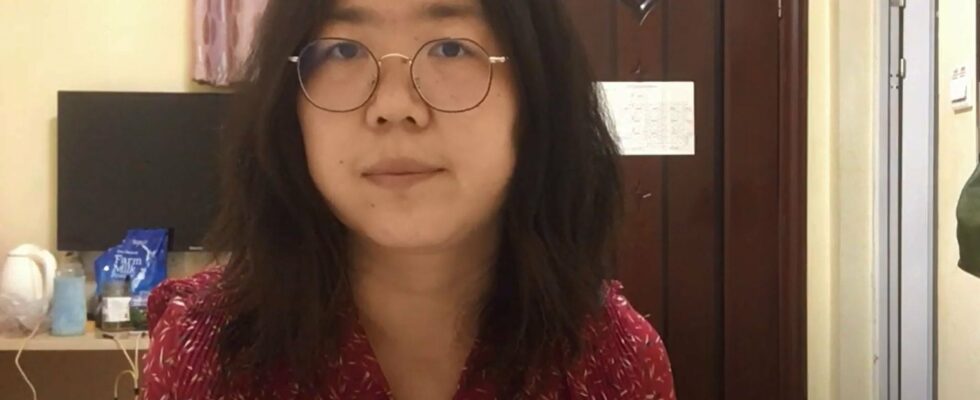Equipped with her backpack, her smartphone and her camera, she went to Wuhan at the very beginning of the Covid-19 pandemic, in January 2020. She is one of the first, and above all one of the only independent journalists to document day by day the unprecedented situation faced by hundreds of millions of Chinese.
For more than three months, former lawyer Zhang Zhan, originally from Shanghai, showed in reports published on her social networks, hospital corridors overflowing with patients on stretchers, the streets of a city with more than eleven millions of inhabitants deserted, and supermarket shelves empty.
In a video broadcast two weeks after her arrival in Wuhan, she denounces the vagueness which weighs on the statistical reality of what is still only a Chinese epidemic. “The city is paralyzed because everything is hidden. […] We must not talk to strangers, it’s dangerous. Without the truth, everything is meaningless. If we cannot attain the truth, if we cannot break the monopoly of the truth, the world means nothing to us.”
Four years in prison for “provoking unrest”
Comments and images which led to her being arrested a few weeks later, in May 2020, before being sentenced to four years in prison for “provoking unrest”. A charge regularly used against political opponents of the regime, notes the british daily The Guardian.
“The judge said her crime was going to Wuhan to conduct interviews and investigations. But in reality, what the judge didn’t like was that she collected these documents and had them put on Twitter (now reference to interviews given to Radio Free Asia, a media outlet funded by the US government.
Hunger strikes, mistreatment…
Incarcerated in Shanghai Women’s Prison, Zhang Zhan went on several hunger strikes. In a few months, the journalist, aged around forty, lost more than 30 kilograms. “People asked me to convince Zhang Zhan to eat something, but she insisted,” determined to continue her fight, her former lawyer explained at the time. A way for the journalist to denounce the conditions of detention, deemed unworthy by those close to her.
In 2021, Zhang Zhan’s mother said that her daughter was so fragile “that she could not hold her head up for lack of strength”. This comes months after Amnesty International revealed that she was chained and force-fed. A treatment which, according to the NGO, is similar to a form of torture. Accusations brushed aside by the Chinese government, which at the same time denies having repressed journalists who would have “exercised their right to freedom of expression on the Internet” during the pandemic.
Fear of limited freedom
After spending four years behind bars without being able to receive visits from her family, the journalist is preparing to be released. A release from prison is planned for Monday, May 13. “A relief” for Maya Wang, associate director for Asia at Human Rights Watch, who nevertheless remains skeptical: it is possible that Zhang Zhan will not regain total freedom upon his release from prison.
Two alternatives are particularly feared by those around him. First, placement under house arrest. “According to my experience […]”, there will be a period during which she will not be allowed to have contact with the outside world, nor to travel,” explains the journalist’s former lawyer. Second, the ban on Zhang Zhan communicating with individuals residents outside China.
For this reason, Amnesty International’s Chinese program asks “the Chinese authorities to ensure that Zhang Zhan is completely free from May 13”, and is “authorized to move freely, to communicate with people at home.” inside and outside China, and to reunite with his family” who must under no circumstances “be the subject of surveillance or harassment”. He added: “The Chinese authorities must also ensure that there are no restrictions on her access to medical treatment following the traumatic ordeal she suffered in prison.”
No confirmation of his release
However, for the time being, human rights associations and Zhang Zhan’s lawyers claim to have received no confirmation of his release. “We are still waiting,” says lawyer Jane Wang impatiently this Monday morning.
But the worry increases as the hours pass. And crystallized after a press conference given by the Chinese Ministry of Foreign Affairs, which refused to confirm his release this Monday afternoon. “What I can tell you is that China is a country governed by the rule of law,” declared the ministry spokesperson, assuring that the rights of prisoners were “fully respected”…
